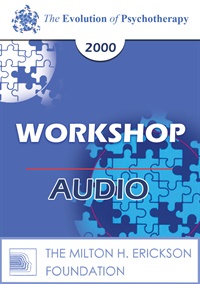EP00 Workshop 05 - Interplay of Addictive Disorders - Claudia Black, PhD
- Average Rating:
- Not yet rated
- Topic Areas:
- Addiction | Workshops | Psychotherapy | Co-Occurring Disorders | Family Systems
- Categories:
- Evolution of Psychotherapy | Evolution of Psychotherapy 2000 | Pioneers in Couples and Family Therapy
- Faculty:
- Claudia Black, PhD
- Duration:
- 2 Hours 30 Minutes
- Format:
- Audio Only
- Original Program Date:
- May 25, 2000
- License:
- Never Expires.
Description
Description: An examination of the evolution of psychotherapy in relation to addiction, highlighting how shame, emotional pain, and family dynamics shape behavior. This workshop addresses how clients with addictive and co-occurring disorders are confounded by family of origin issues. Participants will gain insight into multi-addictive processes. Relationships between these and co-occurring disorders and treatment practices will be explored.
Syllabus Description: This workshop will address how clients with addictive and co-occurring disorders are confounded by family of origin issues. Participants will gain an understanding of· multi-addictive processes. Relationships between these and co-occurring disorders and treatment practices will be addressed.
Educational Objectives:
- To describe the interplay of co-occurring disorders.
- To list characteristics common to addictive processes.
*Sessions may be edited for content and to preserve confidentiality*
Credits
Handouts
| Timestamped Transcript (2 MB) | 57 Pages | Available after Purchase |
| Ericksonian Learning Snapshot (261.7 KB) | 2 Pages | Available after Purchase |
Faculty

Claudia Black, PhD Related Seminars and Products
Claudia Black, Ph.D., is internationally recognized for her pioneering and cutting-edge work with family systems and addictive disorders. Her work with children impacted by drug and alcohol addiction in the late 1970s fueled the advancement of the codependency and developmental trauma fields. Dr. Black’s passion to help young adults overcome obstacles and strengthen families built the foundation of the Claudia Black Young Adult Center. Not only is Dr. Black the clinical architect of this groundbreaking treatment program, she is also actively involved with the treatment team, patients, and their families.
Claudia is the author of It Will Never Happen To Me, Changing Course, My Dad Loves Me, My Dad Has A Disease, Repeat After Me, It's Never Too Late To Have A Happy Childhood, Relapse Toolkit, A Hole in the Sidewalk, Depression Strategies, Straight Talk, The Stamp Game, Family Strategies, Anger Strategies, Deceived: Facing Sexual Betrayal, Lies and Secrets, The Truth Begins With Youand her newest title, Intimate Treason: Healing the Trauma for Partners Confronting Sex Addiction. She has produced seven audio CDs addressing issues of addiction and recovery. They are A Time for Healing, Putting the Past Behind, Triggers, Emotional Baggage, Trauma in the Addicted Family, Imageries and Letting Go Imageries. She also has over 20 DVDs for professionals to use working with families and clients.


